- Home
- Edith Wharton
The Triumph of the Night Page 3
The Triumph of the Night Read online
Page 3
IV
In the gallery, the instinct of self-preservation helped him to turn back and sign to young Rainer not to follow. He stammered out something about a touch of dizziness, and joining them presently; and the boy nodded sympathetically and drew back.
At the foot of the stairs Faxon ran against a servant. “I should like to telephone to Weymore,” he said with dry lips.
“Sorry, sir; wires all down. We’ve been trying the last hour to get New York again for Mr. Lavington.”
Faxon shot on to his room, burst into it, and bolted the door. The lamplight lay on furniture, flowers, books; in the ashes a log still glimmered. He dropped down on the sofa and hid his face. The room was profoundly silent, the whole house was still: nothing about him gave a hint of what was going on, darkly and dumbly, in the room he had flown from, and with the covering of his eyes oblivion and reassurance seemed to fall on him. But they fell for a moment only; then his lids opened again to the monstrous vision. There it was, stamped on his pupils, a part of him forever, an indelible horror burnt into his body and brain. But why into his—just his? Why had he alone been chosen to see what he had seen? What business was it of his, in God’s name? Any one of the others, thus enlightened, might have exposed the horror and defeated it; but he, the one weaponless and defenceless spectator, the one whom none of the others would believe or understand if he attempted to reveal what he knew—_he_ alone had been singled out as the victim of this dreadful initiation!
Suddenly he sat up, listening: he had heard a step on the stairs. Some one, no doubt, was coming to see how he was—to urge him, if he felt better, to go down and join the smokers. Cautiously he opened his door; yes, it was young Rainer’s step. Faxon looked down the passage, remembered the other stairway and darted to it. All he wanted was to get out of the house. Not another instant would he breathe its abominable air! What business was it of his, in God’s name?
He reached the opposite end of the lower gallery, and beyond it saw the hall by which he had entered. It was empty, and on a long table he recognized his coat and cap. He got into his coat, unbolted the door, and plunged into the purifying night.
The darkness was deep, and the cold so intense that for an instant it stopped his breathing. Then he perceived that only a thin snow was falling, and resolutely he set his face for flight. The trees along the avenue marked his way as he hastened with long strides over the beaten snow. Gradually, while he walked, the tumult in his brain subsided. The impulse to fly still drove him forward, but he began feel that he was flying from a terror of his own creating, and that the most urgent reason for escape was the need of hiding his state, of shunning other eyes till he should regain his balance.
He had spent the long hours in the train in fruitless broodings on a discouraging situation, and he remembered how his bitterness had turned to exasperation when he found that the Weymore sleigh was not awaiting him. It was absurd, of course; but, though he had joked with Rainer over Mrs. Culme’s forgetfulness, to confess it had cost a pang. That was what his rootless life had brought him to: for lack of a personal stake in things his sensibility was at the mercy of such trifles…. Yes; that, and the cold and fatigue, the absence of hope and the haunting sense of starved aptitudes, all these had brought him to the perilous verge over which, once or twice before, his terrified brain had hung.
Why else, in the name of any imaginable logic, human or devilish, should he, a stranger, be singled out for this experience? What could it mean to him, how was he related to it, what bearing had it on his case?… Unless, indeed, it was just because he was a stranger—a stranger everywhere—because he had no personal life, no warm screen of private egotisms to shield him from exposure, that he had developed this abnormal sensitiveness to the vicissitudes of others. The thought pulled him up with a shudder. No! Such a fate was too abominable; all that was strong and sound in him rejected it. A thousand times better regard himself as ill, disorganized, deluded, than as the predestined victim of such warnings!
He reached the gates and paused before the darkened lodge. The wind had risen and was sweeping the snow into his race. The cold had him in its grasp again, and he stood uncertain. Should he put his sanity to the test and go back? He turned and looked down the dark drive to the house. A single ray shone through the trees, evoking a picture of the lights, the flowers, the faces grouped about that fatal room. He turned and plunged out into the road….
He remembered that, about a mile from Overdale, the coachman had pointed out the road to Northridge; and he began to walk in that direction. Once in the road he had the gale in his face, and the wet snow on his moustache and eye-lashes instantly hardened to ice. The same ice seemed to be driving a million blades into his throat and lungs, but he pushed on, the vision of the warm room pursuing him.
The snow in the road was deep and uneven. He stumbled across ruts and sank into drifts, and the wind drove against him like a granite cliff. Now and then he stopped, gasping, as if an invisible hand had tightened an iron band about his body; then he started again, stiffening himself against the stealthy penetration of the cold. The snow continued to descend out of a pall of inscrutable darkness, and once or twice he paused, fearing he had missed the road to Northridge; but, seeing no sign of a turn, he ploughed on.
At last, feeling sure that he had walked for more than a mile, he halted and looked back. The act of turning brought immediate relief, first because it put his back to the wind, and then because, far down the road, it showed him the gleam of a lantern. A sleigh was coming—a sleigh that might perhaps give him a lift to the village! Fortified by the hope, he began to walk back toward the light. It came forward very slowly, with unaccountable sigsags and waverings; and even when he was within a few yards of it he could catch no sound of sleigh-bells. Then it paused and became stationary by the roadside, as though carried by a pedestrian who had stopped, exhausted by the cold. The thought made Faxon hasten on, and a moment later he was stooping over a motionless figure huddled against the snow-bank. The lantern had dropped from its bearer’s hand, and Faxon, fearfully raising it, threw its light into the face of Frank Rainer.
“Rainer! What on earth are you doing here?”
The boy smiled back through his pallour. “What are you, I’d like to know?” he retorted; and, scrambling to his feet with a clutch oh Faxon’s arm, he added gaily: “Well, I’ve run you down!”
Faxon stood confounded, his heart sinking. The lad’s face was grey.
“What madness—” he began.
“Yes, it is. What on earth did you do it for?”
“I? Do what?… Why I…. I was just taking a walk…. I often walk at night….”
Frank Rainer burst into a laugh. “On such nights? Then you hadn’t bolted?”
“Bolted?”
“Because I’d done something to offend you? My uncle thought you had.”
Faxon grasped his arm. “Did your uncle send you after me?”
“Well, he gave me an awful rowing for not going up to your room with you when you said you were ill. And when we found you’d gone we were frightened—and he was awfully upset—so I said I’d catch you…. You’re not ill, are you?”
“Ill? No. Never better.” Faxon picked up the lantern. “Come; let’s go back. It was awfully hot in that diningroom.”
“Yes; I hoped it was only that.”
They trudged on in silence for a few minutes; then Faxon questioned: “You’re not too done up?”
“Oh, no. It’s a lot easier with the wind behind us.”
“All right Don’t talk any more.”
They pushed ahead, walking, in spite of the light that guided them, more slowly than Faxon had walked alone into the gale. The fact of his companion’s stumbling against a drift gave Faxon a pretext for saying: “Take hold of my arm,” and Rainer obeying, gasped out: “I’m blown!”
“So am I. Who wouldn’t be?”
“What a dance you led me! If it hadn’t been for one of the servants happening to see you—”
/>
“Yes; all right. And now, won’t you kindly shut up?”
Rainer laughed and hung on him. “Oh, the cold doesn’t hurt me….”
For the first few minutes after Rainer had overtaken him, anxiety for the lad had been Faxon’s only thought. But as each labouring step carried them nearer to the spot he had been fleeing, the reasons for his flight grew more ominous and more insistent. No, he was not ill, he was not distraught and deluded—he was the instrument singled out to warn and save; and here he was, irresistibly driven, dragging the victim back to his doom!
The intensity of the conviction had almost checked his steps. But what could he do or say? At all costs he must get Rainer out of the cold, into the house and into his bed. After that he would act.
The snow-fall was thickening, and as they reached a stretch of the road between open fields the wind took them at an angle, lashing their faces with barbed thongs. Rainer stopped to take breath, and Faxon felt the heavier pressure of his arm.
“When we get to the lodge, can’t we telephone to the stable for a sleigh?”
“If they’re not all asleep at the lodge.”
“Oh, I’ll manage. Don’t talk!” Faxon ordered; and they plodded on….
At length the lantern ray showed ruts that curved away from the road under tree-darkness.
Faxon’s spirits rose. “There’s the gate! We’ll be there in five minutes.”
As he spoke he caught, above the boundary hedge, the gleam of a light at the farther end of the dark avenue. It was the same light that had shone on the scene of which every detail was burnt into his brain; and he felt again its overpowering reality. No—he couldn’t let the boy go back!
They were at the lodge at last, and Faxon was hammering on the door. He said to himself: “I’ll get him inside first, and make them give him a hot drink. Then I’ll see—I’ll find an argument….”
There was no answer to his knocking, and after an interval Rainer said: “Look here—we’d better go on.”
“No!”
“I can, perfectly—”
“You sha’n’t go to the house, I say!” Faxon redoubled his blows, and at length steps sounded on the stairs. Rainer was leaning against the lintel, and as the door opened the light from the hall flashed on his pale face and fixed eyes. Faxon caught him by the arm and drew him in.
“It was cold out there.” he sighed; and then, abruptly, as if invisible shears at a single stroke had cut every muscle in his body, he swerved, drooped on Faxon’s arm, and seemed to sink into nothing at his feet.
The lodge-keeper and Faxon bent over him, and somehow, between them, lifted him into the kitchen and laid him on a sofa by the stove.
The lodge-keeper, stammering: “I’ll ring up the house,” dashed out of the room. But Faxon heard the words without heeding them: omens mattered nothing now, beside this woe fulfilled. He knelt down to undo the fur collar about Rainer’s throat, and as he did so he felt a warm moisture on his hands. He held them up, and they were red….
V
The palms threaded their endless line along the yellow river. The little steamer lay at the wharf, and George Faxon, sitting in the verandah of the wooden hotel, idly watched the coolies carrying the freight across the gang-plank.
He had been looking at such scenes for two months. Nearly five had elapsed since he had descended from the train at Northridge and strained his eyes for the sleigh that was to take him to Weymore: Weymore, which he was never to behold!… Part of the interval—the first part—was still a great grey blur. Even now he could not be quite sure how he had got back to Boston, reached the house of a cousin, and been thence transferred to a quiet room looking out on snow under bare trees. He looked out a long time at the same scene, and finally one day a man he had known at Harvard came to see him and invited him to go out on a business trip to the Malay Peninsula.
“You’ve had a bad shake-up, and it’ll do you no end of good to get away from things.”
When the doctor came the next day it turned out that he knew of the plan and approved it. “You ought to be quiet for a year. Just loaf and look at the landscape,” he advised.
Paxon felt the first faint stirrings of curiosity.
“What’s been the matter with me, anyway?”
“Well, over-work, I suppose. You must have been bottling up for a bad breakdown before you started for New Hampshire last December. And the shock of that poor boy’s death did the rest.”
Ah, yes—Rainer had died. He remembered….
He started for the East, and gradually, by imperceptible degrees, life crept back into his weary bones and leaden brain. His friend was patient and considerate, and they travelled slowly and talked little. At first Faxon had felt a great shrinking from whatever touched on familiar things. He seldom looked at a newspaper and he never opened a letter without a contraction of the heart. It was not that he had any special cause for apprehension, but merely that a great trail of darkness lay on everything. He had looked too deep down into the abyss…. But little by little health and energy returned to him, and with them the common promptings of curiosity. He was beginning to wonder how the world was going, and when, presently, the hotel-keeper told him there were no letters for him in the steamer’s mail-bag, he felt a distinct sense of disappointment. His friend had gone into the jungle on a long excursion, and he was lonely, unoccupied and wholesomely bored. He got up and strolled into the stuffy reading-room.
There he found a game of dominoes, a mutilated picture-puzzle, some copies of Zion’s Herald and a pile of New York and London newspapers.
He began to glance through the papers, and was disappointed to find that they were less recent than he had hoped. Evidently the last numbers had been carried off by luckier travellers. He continued to turn them over, picking out the American ones first. These, as it happened, were the oldest: they dated back to December and January. To Faxon, however, they had all the flavour of novelty, since they covered the precise period during which he had virtually ceased to exist. It had never before occurred to him to wonder what had happened in the world during that interval of obliteration; but now he felt a sudden desire to know.
To prolong the pleasure, he began by sorting the papers chronologically, and as he found and spread out the earliest number, the date at the top of the page entered into his consciousness like a key slipping into a lock. It was the seventeenth of December: the date of the day after his arrival at Northridge. He glanced at the first page and read in blazing characters: “Reported Failure of Opal Cement Company. Lavington’s name involved. Gigantic Exposure of Corruption Shakes Wall Street to Its Foundations.”
He read on, and when he had finished the first paper he turned to the next. There was a gap of three days, but the Opal Cement “Investigation” still held the centre of the stage. From its complex revelations of greed and ruin his eye wandered to the death notices, and he read: “Rainer. Suddenly, at Northridge, New Hampshire, Francis John, only son of the late….”
His eyes clouded, and he dropped the newspaper and sat for a long time with his face in his hands. When he looked up again he noticed that his gesture had pushed the other papers from the table and scattered them at his feet. The uppermost lay spread out before him, and heavily his eyes began their search again. “John Lavington comes forward with plan for reconstructing Company. Offers to put in ten millions of his own—The proposal under consideration by the District Attorney.”
Ten millions… ten millions of his own. But if John Lavington was ruined?… Pazon stood up with a cry. That was it, then—that was what the warning meant! And if he had not fled from it, dashed wildly away from it into the night, he might have broken the spell of iniquity, the powers of darkness might not have prevailed! He caught up the pile of newspapers and began to glance through each in turn for the head-line: “Wills Admitted to Probate.” In the last of all he found the paragraph he sought, and it stared up at him as if with Rainer’s dying eyes.
That—_that_ was what he had done! The
powers of pity had singled him out to warn and save, and he had closed his ears to their call, and washed his hands of it, and fled. Washed his hands of it! That was the word. It caught him back to the dreadful moment in the lodge when, raising himself up from Rainer’s side, he had looked at his hands and seen that they were red….
End of the Project Gutenberg EBook of The Triumph Of Night, by Edith Wharton
*** END OF THIS PROJECT GUTENBERG EBOOK THE TRIUMPH OF NIGHT ***
***** This file should be named 24351.txt or 24351.zip ***** This and all associated files of various formats will be found in: http://www.gutenberg.org/2/4/3/5/24351/
Produced by David Widger
Updated editions will replace the previous one—the old editions will be renamed.
Creating the works from public domain print editions means that no one owns a United States copyright in these works, so the Foundation (and you!) can copy and distribute it in the United States without permission and without paying copyright royalties. Special rules, set forth in the General Terms of Use part of this license, apply to copying and distributing Project Gutenberg-tm electronic works to protect the PROJECT GUTENBERG-tm concept and trademark. Project Gutenberg is a registered trademark, and may not be used if you charge for the eBooks, unless you receive specific permission. If you do not charge anything for copies of this eBook, complying with the rules is very easy. You may use this eBook for nearly any purpose such as creation of derivative works, reports, performances and research. They may be modified and printed and given away—you may do practically ANYTHING with public domain eBooks. Redistribution is subject to the trademark license, especially commercial redistribution.
*** START: FULL LICENSE ***
THE FULL PROJECT GUTENBERG LICENSE PLEASE READ THIS BEFORE YOU DISTRIBUTE OR USE THIS WORK
To protect the Project Gutenberg-tm mission of promoting the free distribution of electronic works, by using or distributing this work (or any other work associated in any way with the phrase “Project Gutenberg”), you agree to comply with all the terms of the Full Project Gutenberg-tm License (available with this file or online at http://gutenberg.org/license).

 The Age of Innocence
The Age of Innocence The Reef
The Reef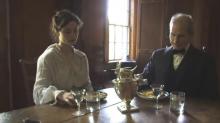 Summer
Summer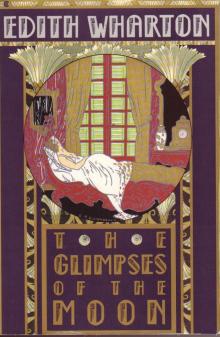 The Glimpses of the Moon
The Glimpses of the Moon Xingu
Xingu The Fruit of the Tree
The Fruit of the Tree Fast and Loose
Fast and Loose Artemis to Actaeon and Other Verse
Artemis to Actaeon and Other Verse The Line of Least Resistance
The Line of Least Resistance The Lamp of Psyche
The Lamp of Psyche The Reckoning
The Reckoning Afterward
Afterward The New York Stories of Edith Wharton
The New York Stories of Edith Wharton The 2014 Halloween Horrors Megapack
The 2014 Halloween Horrors Megapack 'Copy': A Dialogue
'Copy': A Dialogue The Recovery
The Recovery The Fulness of Life
The Fulness of Life Early Short Stories Vol. 1
Early Short Stories Vol. 1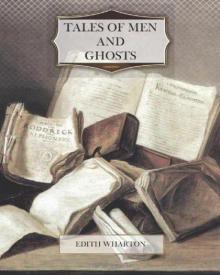 Tales of Men and Ghosts
Tales of Men and Ghosts The House of the Dead Hand
The House of the Dead Hand That Good May Come
That Good May Come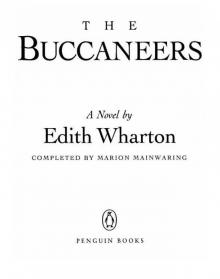 The Buccaneers
The Buccaneers Other Times, Other Manners
Other Times, Other Manners The Hermit and the Wild Woman
The Hermit and the Wild Woman Kerfol
Kerfol The Duchess at Prayer
The Duchess at Prayer Bunner Sisters
Bunner Sisters The Choice
The Choice Madame De Treymes
Madame De Treymes Ethan Frome, Summer, Bunner Sisters
Ethan Frome, Summer, Bunner Sisters In Morocco
In Morocco The Valley of Decision
The Valley of Decision Age of Innocence (Barnes & Noble Classics Series)
Age of Innocence (Barnes & Noble Classics Series) The Angel at the Grave
The Angel at the Grave April Showers
April Showers Sanctuary
Sanctuary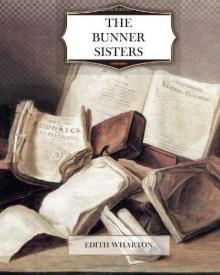 The Bunner Sisters
The Bunner Sisters Mrs. Manstey's View
Mrs. Manstey's View Writing a War Story
Writing a War Story The Custom of the Country
The Custom of the Country In Trust
In Trust The Triumph of the Night
The Triumph of the Night The Hermit and the Wild Woman, and Other Stories
The Hermit and the Wild Woman, and Other Stories Roman Fever and Other Stories
Roman Fever and Other Stories The Mission of Jane
The Mission of Jane The Descent of Man and Other Stories
The Descent of Man and Other Stories Coming Home
Coming Home The Touchstone
The Touchstone Early Short Stories Vol. 2
Early Short Stories Vol. 2 Edith Wharton's Verse, 1879-1919, from various journals.
Edith Wharton's Verse, 1879-1919, from various journals.